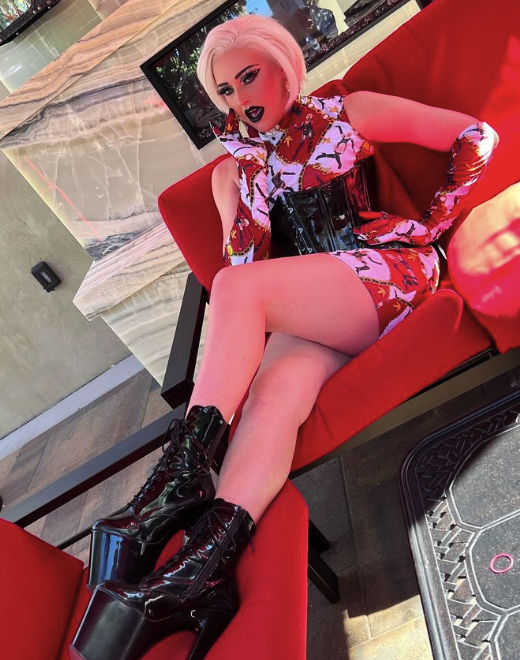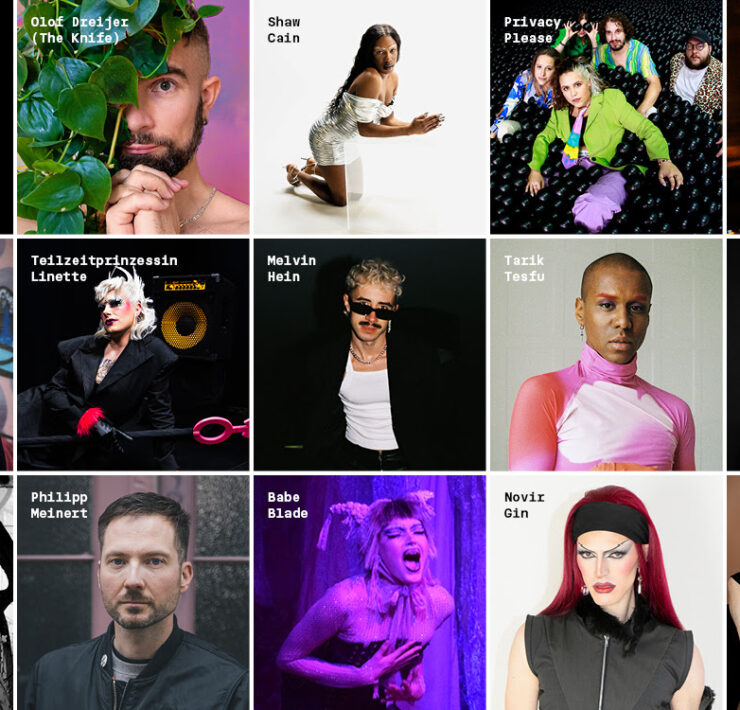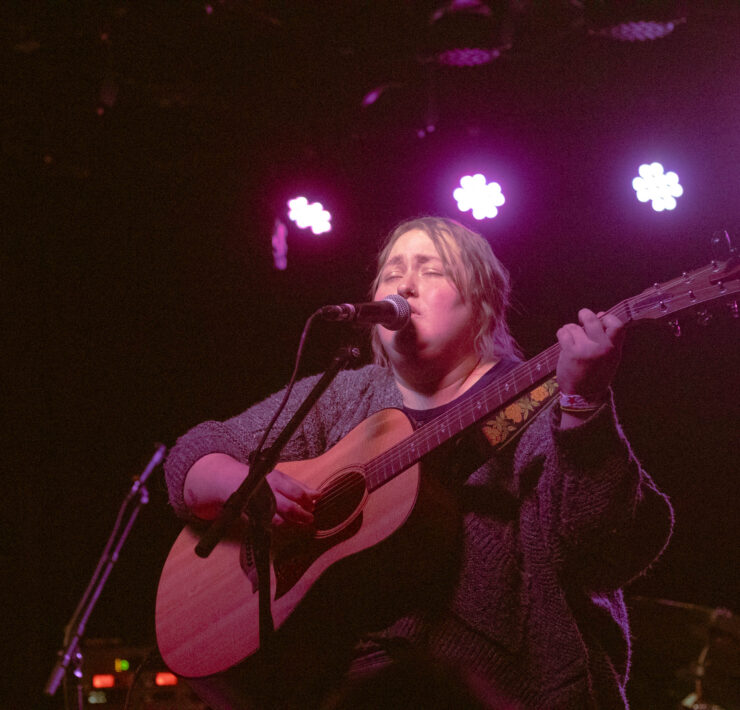Sum of Us Fest Brings Queer Joy to Nature’s Splendor

An LGBT bilingual writer, Eleni was born and raised in…
Back in 2019, Madison Eker wanted to create a space wherein queer women could connect over similar interests. The bulk of LGBTQ socializing, she found, seemed to center around night-life. So Eker began envisioning spaces that might bring women together in the light of day. From this imaginative process came Sum of Us—a wellness festival that was originally scheduled to take place in May of 2020.
After the pandemic necessitated a shift to virtual for the last two years, this year Sum of Us is finally ready to convene in person on a beautiful patch of land just outside of California’s Yosemite. Women, trans, and nonbinary folks can take part in this three-day event (scheduled for the third weekend in May) while camping in tents or RVs on the festival grounds.
Eker acknowledges how profound the need for healing is now, as we collectively emerge from two isolating years.
“The fact that LGBTQ individuals face some of the highest rates of mental health struggles makes spaces like these all the more important,” she says. “Especially after the past two years we’ve had, where everyone’s mental health was really challenged.”
A Queer Nature Utopia
When Eker showed me the event map—which shimmers like a page from a book of fairytales—I was moved by the amount of heart and care that seemed to have gone into its planning. Enchanting-sounding places such as “the Land of Unlearning,” “the Lawn of New Beginnings,” and “the Tiny House of Meditation” pepper the grid next to meadows and a swimming hole, adding touches of imagination and whimsicality. For me, the layout brings to mind a Queer Disneyland meets nature spa.
Among the events scheduled are dance parties, nature walks, a “sweat out your stress” fitness session directed by Allison Tibbs, and varied workshops led by speakers who are all experts in their field. Topics of these workshops will range from self-defense and personal boundaries to queer dating essentials to financial wellness.
Denisha Davis will share tips for how to be an ally for those living with chronic pain, while Kaylynn Marisol (“The Vulva Witch”) will lead participants in embracing their bits through “drawing, celebrating, and normalizing them.”
Eker emphasizes that she and her team want these seminars to be interactive too—so that participants aren’t just passively taking in information.
“Every workshop is designed to connect, either with yourself or the people around you,” she says. “So it’s not like you just go and hear someone talk. It’s more, OK find somebody who has the same color shirt on as you. Turn to the person next to you and share. We want people to leave having made connections.”
Additionally, POC-run company Made in Color will be putting on an art installation.
“They’ll affix postcards with affirmations onto our festival bridge. Attendees can take off and keep whichever one resonates most with them.”
Eker says that the installation “will be an opportunity to thoughtfully provoke attendees to release and reimagine what their brighter future will be.”
“Bridges have long represented transitions and new beginnings,” she explains.

On the final day, festival-goers will reconnect with their inner child while playing field games like capture the flag and tug of war.
If all of that seems like too much scintillating activity for a single weekend to contain, vendors like Auntie’s Coffee will be around, offering caffeinated elixirs to help keep participants’ minds alert enough to take it all in. Meanwhile Chef Zeus—an Oakland-based, Black, nonbinary chef—will serve up sumptuous vegan food topped with rich sauces.
Magical as this event sounds, Eker is quick to clarify that she is only one part of the team responsible for making it happen.
“I do a lot of it; it’s beyond my full-time job. But so many other amazing brains went into it as well. I got lucky with finding folks, quite naturally, who had the same vision. Our name comes from the fact that we’re this collaboration. We’re the sum of these underrepresented groups of people that have come together.”
Comfort and Solace for Underserved Groups
On the topic of underrepresented groups, I was happy to hear that Eker and her team had arranged accommodations for people with disabilities, as well as ASL interpreters.
It was important to her that the festival also be a safe space for trans folks. For this reason they have planned a Trans Body Celebration swim “dedicated to eradicating judgment and celebrating bodies just as they are.” Speaker Ella Baker, a queer Korean-American transgender woman who specializes in trans belonging and spirituality, will shine light on trans individuals’ roles in diverse religious and spiritual traditions.
Sum of Us will serve as a space free from hetero assumptions. As a self-identifying queer femme, I was particularly excited by this. Out in the larger world, many of us “straight-passing queers” often feel involuntarily cloaked in a robe of invisibility. The onus is on us to decide when, and how, to pull it off. Heteronormativity turns coming out into a lifelong process.
For this reason, events like Sum of Us seem like they’d be wonderful venues through which to find our people, I remark to Eker.
This experience of queer invisibility is one that I discover, through our conversation, that she and I have in common.
Eker says that she too has encountered her share of micro-aggressions. It’s not uncommon for strangers to ask her questions like “Where’s your boyfriend?” Even within the queer community, people have cast doubt over her sexuality—making comments to her like, “You’re not really gay.”
The most challenging moments, Eker says, are when she is out with her partner and certain men approach them. Some of these men view their sexuality as an invitation.
“Or they think it’s for them. Like, ‘Let’s all dance; let’s all go home together.’ We are not pornography for you; this is my life. This is the person I love, who I’m trying to have a pleasant night out with.”
Eker described the accumulation of these comments over time as “death by a thousand cuts.”
There will be no cis men to sour the air with threesome propositions—or any other lewd or presumptuous comments, for that matter—at this year’s festival (*save for perhaps a male grizzly bear rummaging the compost bin for remnants of Chef Zeus’ cooking). Sum of Us is specifically for women and nonbinary folks.
“It would be ideal if we could just eradicate all these stereotypes, in all forms,” Eker says.
In the meantime though, queer spaces provide at least partial refuge.
Finding women to date can be an additional challenge for us queer, invisible femmes. Apps have greatly expanded our options. Still, at times, they can feel like interviews. They can also feel like pressured situations wherein both people are there to make a snap decision.
Meeting organically removes some of that pressure, allowing relationships to grow through common interests and shared activities. Had any attendees made romantic connections at Sum of Us? I’m interested to know. Eker says that some had.
“At last year’s virtual events, a few left with partners whom they dated throughout the pandemic,” she recalls. “Even though that’s not necessarily the goal. The goal is more to get really cool, conscious, like-minded people together in one space and say ‘Here you all are. Let’s see what happens.’”
Defining wellness and the future of Sum Of Us
I’m curious as to what wellness looks like for Eker, as someone planning a festival dedicated to it. I’m also interested to know how she personally defines it.

“When people hear the word ‘wellness,’ a lot of them think of fitness or yoga or nutrition. But I think there’s more to it than just those things,” Eker says. “I consider wellness more generally as having to do with mental health and personal growth. I think of it as integrating mind, body, spirit, and soul. When you feel great about yourself on the inside it becomes a mirror to the rest of your life.”
Hot yoga, hikes, and time spent outdoors are all parts of her personal wellness practice. Her reverence for nature shines through in her reflections on the magical skies, desert hikes, and breathtaking sunsets of Arizona (where Eker attended college).
“The moon is always bright and shining,” she recalls with wonder. “I lived close to Sedona, which has all these beautiful red rocks. It all just feels very mystical.”
Eker also describes herself as a “personal growth lover” who finds uncovering deeper truths about both herself and her friends deeply satisfying.
As for what’s next: Eker hopes to make the Sum of Us Festival a yearly event. She will also continue to run her main business, the Sum of Us company, which focuses on training organizations in awareness and ally-ship.
Through our conversation, it’s evident to me just how much Sum of Us is an act of love and service on Eker’s part. Eker herself explains that it was “not anything that (she) intended to make crazy amounts of money on.”
“My intention was more, this is something I feel needs to happen for our community. And ultimately my hope is just for people to have the greatest time of their life.”
With access to such an array of engaging activities and varied minds—all taking place within the jaw-dropping setting of California’s most famous and scenic National Park— it’s hard to imagine that their experience will be anything less.
Photos courtesy of Sum of Us
What's Your Reaction?
An LGBT bilingual writer, Eleni was born and raised in the Bay Area. Her work has been published in Tiny Buddha, The Mighty, Thought Catalog, Elephant Journal, The Fix, The Mindful Word, and Uncomfortable Revolution among others. You can follow her on IG @eleni_steph_writer and read stories from her time as a rideshare driver at lyfttales.com










